Nursing: Reflective Analysis of Safe and Effective Practice Report
VerifiedAdded on 2022/12/22
|13
|4189
|53
Report
AI Summary
This report presents a reflective analysis of a nursing student's experience in providing safe and effective care, specifically focusing on a stroke patient. The student utilizes the Gibbs Reflective Cycle model to dissect their experiences, feelings, evaluations, analyses, conclusions, and action plans related to the care provided. The report details the student's involvement in inter-professional working, highlighting the importance of teamwork, roles, relationships, professional identity, and professionalism in delivering holistic care. The student reflects on the challenges and opportunities encountered, emphasizing the significance of communication skills, patient and family involvement, and the application of evidence-based practices. The analysis includes a critical review of the experience, connecting it to relevant literature and exploring the concepts of inter-professional working and service user involvement in contemporary health and social care. The report concludes with an evaluation of the student's professional development and insights gained from the experience, offering a comprehensive overview of the student's journey towards providing safe and effective patient care. The report demonstrates how the student developed the skills and knowledge necessary to manage the patient, and how they applied the principles of person-centered care.
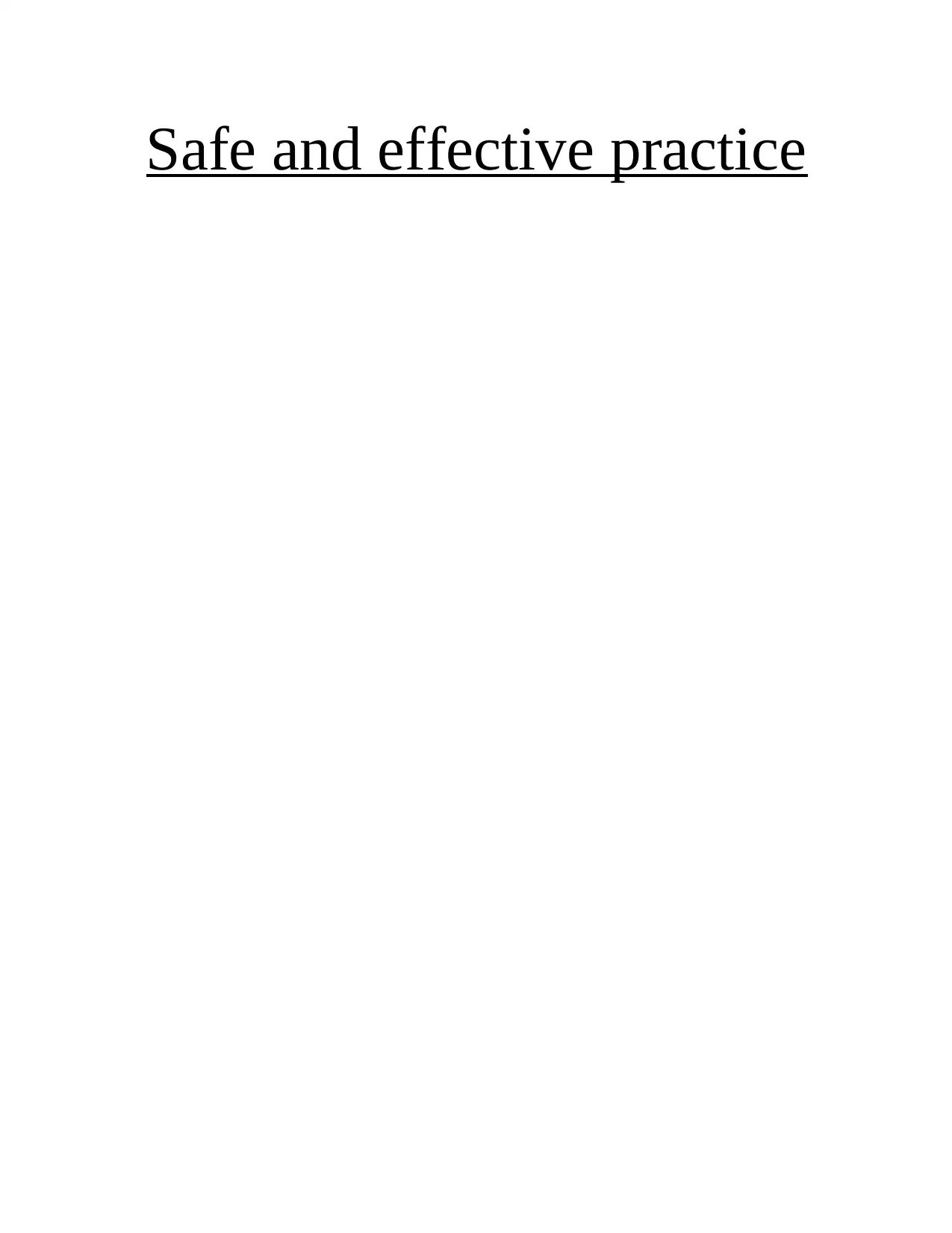
Safe and effective practice
Paraphrase This Document
Need a fresh take? Get an instant paraphrase of this document with our AI Paraphraser
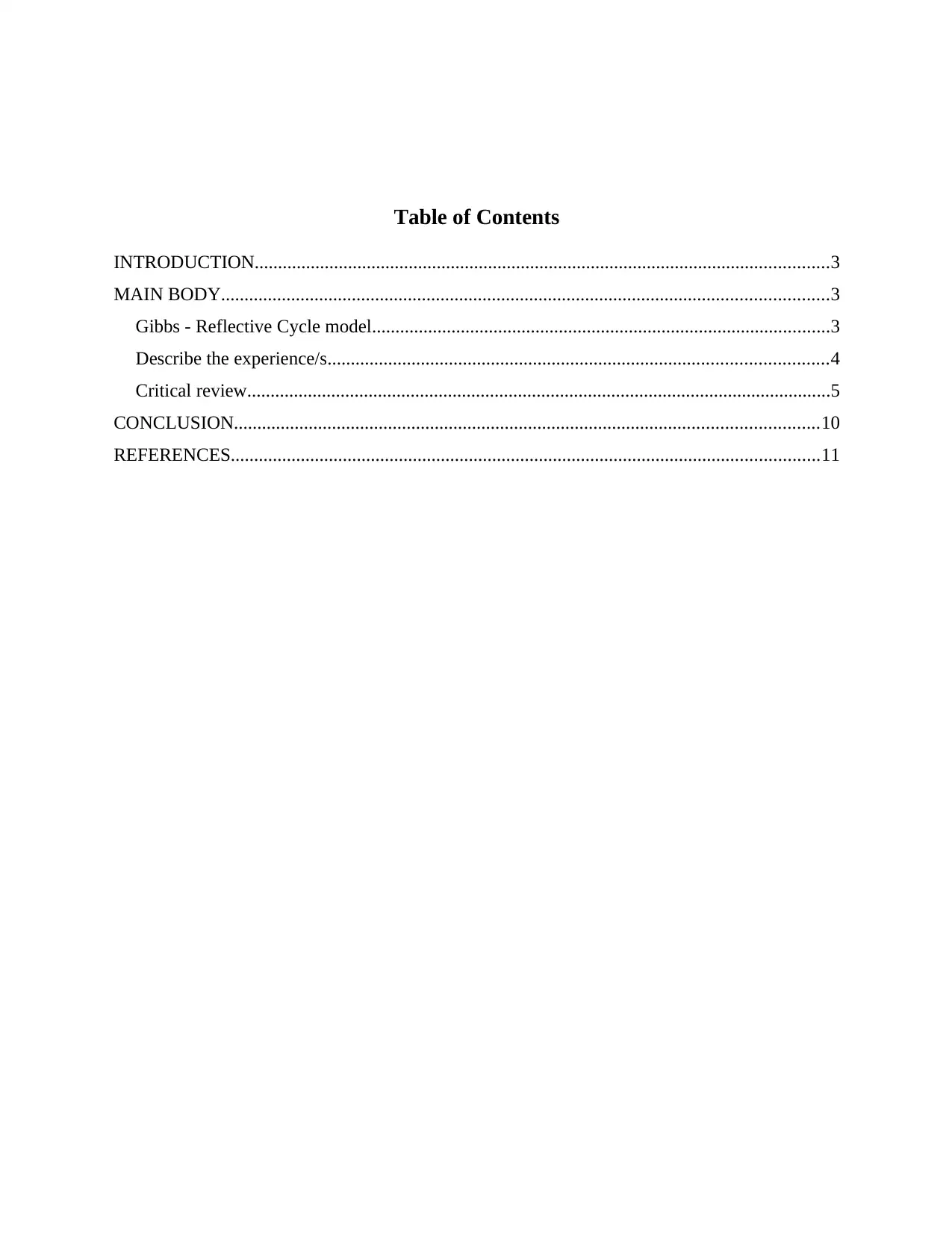
Table of Contents
INTRODUCTION...........................................................................................................................3
MAIN BODY..................................................................................................................................3
Gibbs - Reflective Cycle model..................................................................................................3
Describe the experience/s...........................................................................................................4
Critical review.............................................................................................................................5
CONCLUSION.............................................................................................................................10
REFERENCES..............................................................................................................................11
INTRODUCTION...........................................................................................................................3
MAIN BODY..................................................................................................................................3
Gibbs - Reflective Cycle model..................................................................................................3
Describe the experience/s...........................................................................................................4
Critical review.............................................................................................................................5
CONCLUSION.............................................................................................................................10
REFERENCES..............................................................................................................................11
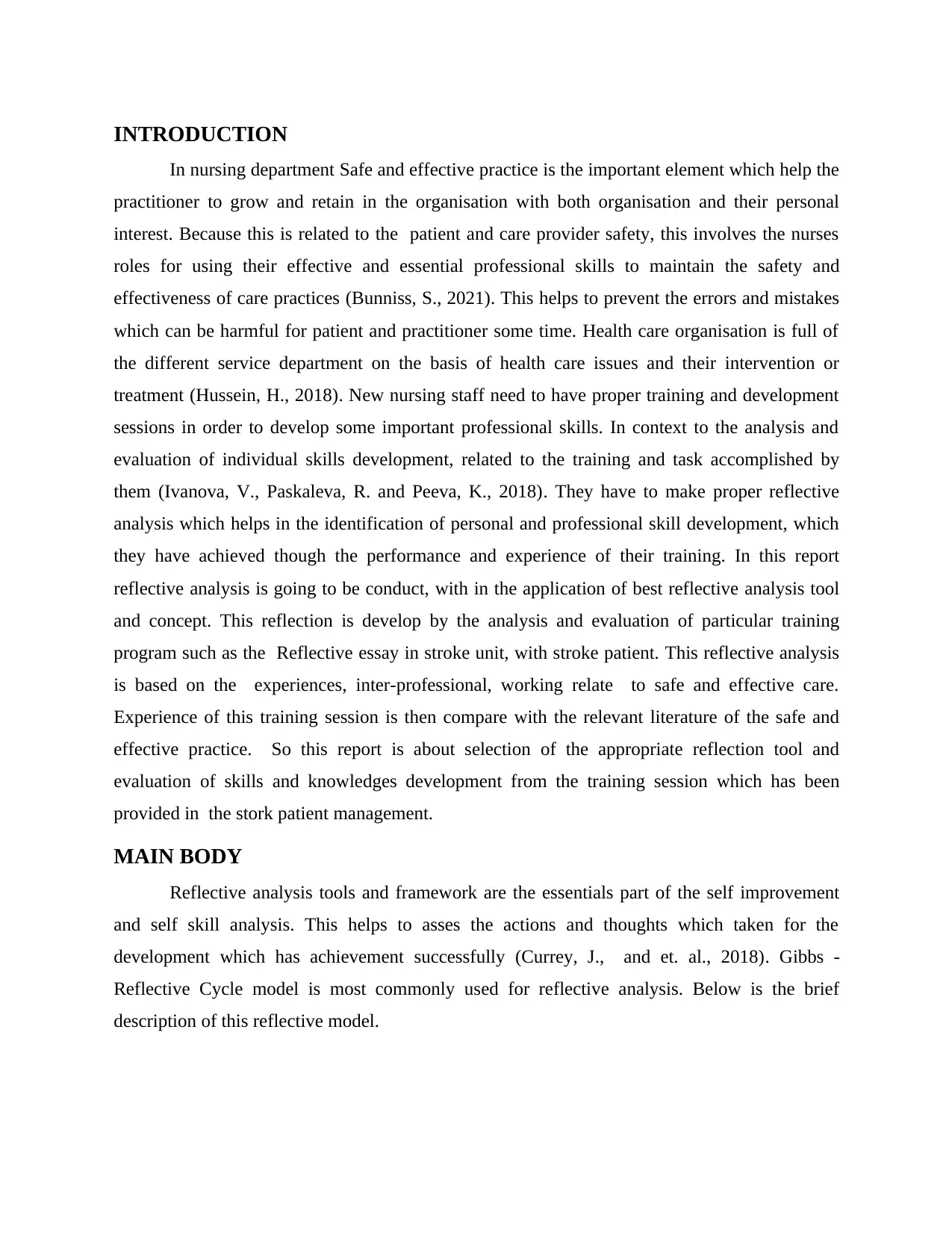
INTRODUCTION
In nursing department Safe and effective practice is the important element which help the
practitioner to grow and retain in the organisation with both organisation and their personal
interest. Because this is related to the patient and care provider safety, this involves the nurses
roles for using their effective and essential professional skills to maintain the safety and
effectiveness of care practices (Bunniss, S., 2021). This helps to prevent the errors and mistakes
which can be harmful for patient and practitioner some time. Health care organisation is full of
the different service department on the basis of health care issues and their intervention or
treatment (Hussein, H., 2018). New nursing staff need to have proper training and development
sessions in order to develop some important professional skills. In context to the analysis and
evaluation of individual skills development, related to the training and task accomplished by
them (Ivanova, V., Paskaleva, R. and Peeva, K., 2018). They have to make proper reflective
analysis which helps in the identification of personal and professional skill development, which
they have achieved though the performance and experience of their training. In this report
reflective analysis is going to be conduct, with in the application of best reflective analysis tool
and concept. This reflection is develop by the analysis and evaluation of particular training
program such as the Reflective essay in stroke unit, with stroke patient. This reflective analysis
is based on the experiences, inter-professional, working relate to safe and effective care.
Experience of this training session is then compare with the relevant literature of the safe and
effective practice. So this report is about selection of the appropriate reflection tool and
evaluation of skills and knowledges development from the training session which has been
provided in the stork patient management.
MAIN BODY
Reflective analysis tools and framework are the essentials part of the self improvement
and self skill analysis. This helps to asses the actions and thoughts which taken for the
development which has achievement successfully (Currey, J., and et. al., 2018). Gibbs -
Reflective Cycle model is most commonly used for reflective analysis. Below is the brief
description of this reflective model.
In nursing department Safe and effective practice is the important element which help the
practitioner to grow and retain in the organisation with both organisation and their personal
interest. Because this is related to the patient and care provider safety, this involves the nurses
roles for using their effective and essential professional skills to maintain the safety and
effectiveness of care practices (Bunniss, S., 2021). This helps to prevent the errors and mistakes
which can be harmful for patient and practitioner some time. Health care organisation is full of
the different service department on the basis of health care issues and their intervention or
treatment (Hussein, H., 2018). New nursing staff need to have proper training and development
sessions in order to develop some important professional skills. In context to the analysis and
evaluation of individual skills development, related to the training and task accomplished by
them (Ivanova, V., Paskaleva, R. and Peeva, K., 2018). They have to make proper reflective
analysis which helps in the identification of personal and professional skill development, which
they have achieved though the performance and experience of their training. In this report
reflective analysis is going to be conduct, with in the application of best reflective analysis tool
and concept. This reflection is develop by the analysis and evaluation of particular training
program such as the Reflective essay in stroke unit, with stroke patient. This reflective analysis
is based on the experiences, inter-professional, working relate to safe and effective care.
Experience of this training session is then compare with the relevant literature of the safe and
effective practice. So this report is about selection of the appropriate reflection tool and
evaluation of skills and knowledges development from the training session which has been
provided in the stork patient management.
MAIN BODY
Reflective analysis tools and framework are the essentials part of the self improvement
and self skill analysis. This helps to asses the actions and thoughts which taken for the
development which has achievement successfully (Currey, J., and et. al., 2018). Gibbs -
Reflective Cycle model is most commonly used for reflective analysis. Below is the brief
description of this reflective model.
⊘ This is a preview!⊘
Do you want full access?
Subscribe today to unlock all pages.

Trusted by 1+ million students worldwide
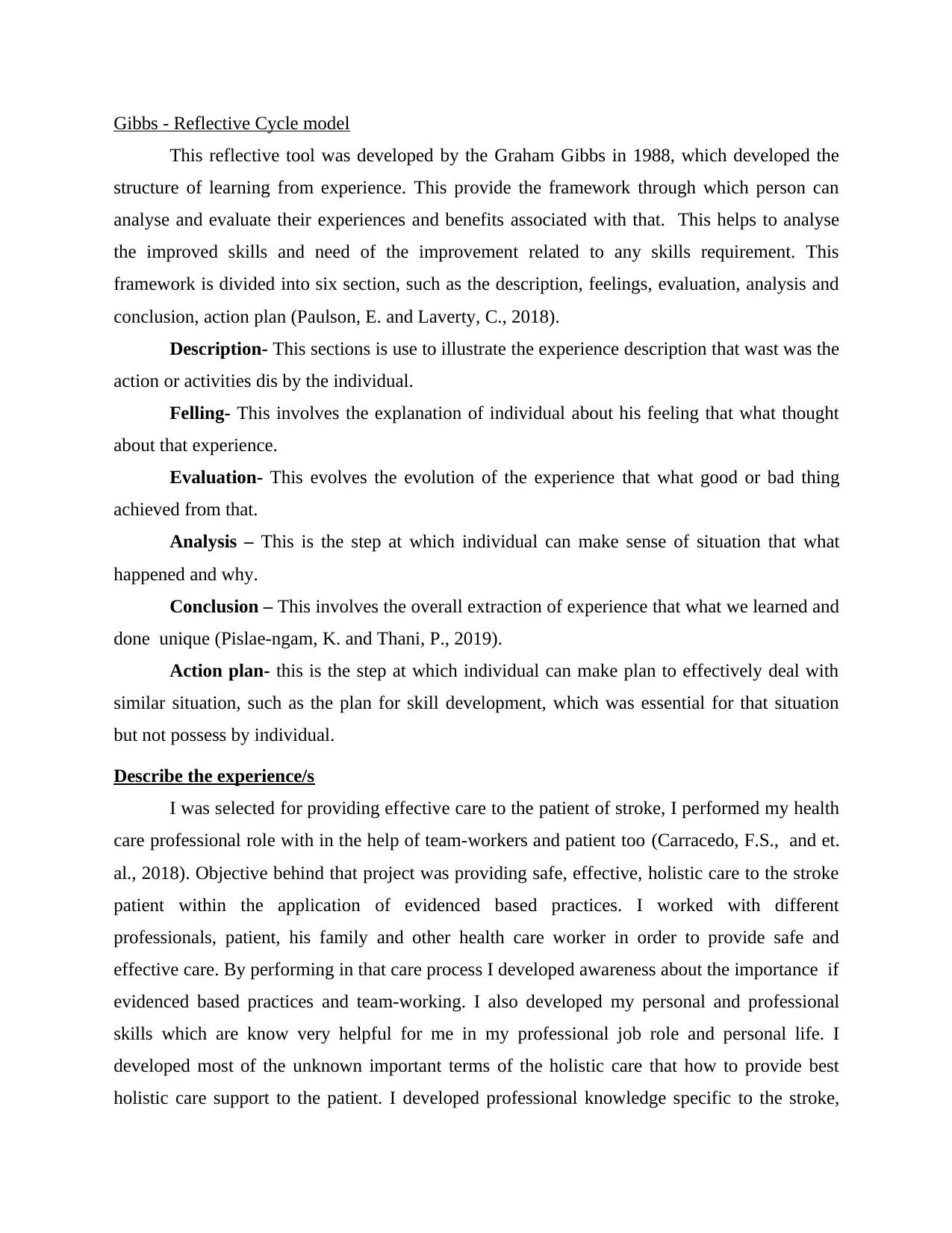
Gibbs - Reflective Cycle model
This reflective tool was developed by the Graham Gibbs in 1988, which developed the
structure of learning from experience. This provide the framework through which person can
analyse and evaluate their experiences and benefits associated with that. This helps to analyse
the improved skills and need of the improvement related to any skills requirement. This
framework is divided into six section, such as the description, feelings, evaluation, analysis and
conclusion, action plan (Paulson, E. and Laverty, C., 2018).
Description- This sections is use to illustrate the experience description that wast was the
action or activities dis by the individual.
Felling- This involves the explanation of individual about his feeling that what thought
about that experience.
Evaluation- This evolves the evolution of the experience that what good or bad thing
achieved from that.
Analysis – This is the step at which individual can make sense of situation that what
happened and why.
Conclusion – This involves the overall extraction of experience that what we learned and
done unique (Pislae-ngam, K. and Thani, P., 2019).
Action plan- this is the step at which individual can make plan to effectively deal with
similar situation, such as the plan for skill development, which was essential for that situation
but not possess by individual.
Describe the experience/s
I was selected for providing effective care to the patient of stroke, I performed my health
care professional role with in the help of team-workers and patient too (Carracedo, F.S., and et.
al., 2018). Objective behind that project was providing safe, effective, holistic care to the stroke
patient within the application of evidenced based practices. I worked with different
professionals, patient, his family and other health care worker in order to provide safe and
effective care. By performing in that care process I developed awareness about the importance if
evidenced based practices and team-working. I also developed my personal and professional
skills which are know very helpful for me in my professional job role and personal life. I
developed most of the unknown important terms of the holistic care that how to provide best
holistic care support to the patient. I developed professional knowledge specific to the stroke,
This reflective tool was developed by the Graham Gibbs in 1988, which developed the
structure of learning from experience. This provide the framework through which person can
analyse and evaluate their experiences and benefits associated with that. This helps to analyse
the improved skills and need of the improvement related to any skills requirement. This
framework is divided into six section, such as the description, feelings, evaluation, analysis and
conclusion, action plan (Paulson, E. and Laverty, C., 2018).
Description- This sections is use to illustrate the experience description that wast was the
action or activities dis by the individual.
Felling- This involves the explanation of individual about his feeling that what thought
about that experience.
Evaluation- This evolves the evolution of the experience that what good or bad thing
achieved from that.
Analysis – This is the step at which individual can make sense of situation that what
happened and why.
Conclusion – This involves the overall extraction of experience that what we learned and
done unique (Pislae-ngam, K. and Thani, P., 2019).
Action plan- this is the step at which individual can make plan to effectively deal with
similar situation, such as the plan for skill development, which was essential for that situation
but not possess by individual.
Describe the experience/s
I was selected for providing effective care to the patient of stroke, I performed my health
care professional role with in the help of team-workers and patient too (Carracedo, F.S., and et.
al., 2018). Objective behind that project was providing safe, effective, holistic care to the stroke
patient within the application of evidenced based practices. I worked with different
professionals, patient, his family and other health care worker in order to provide safe and
effective care. By performing in that care process I developed awareness about the importance if
evidenced based practices and team-working. I also developed my personal and professional
skills which are know very helpful for me in my professional job role and personal life. I
developed most of the unknown important terms of the holistic care that how to provide best
holistic care support to the patient. I developed professional knowledge specific to the stroke,
Paraphrase This Document
Need a fresh take? Get an instant paraphrase of this document with our AI Paraphraser
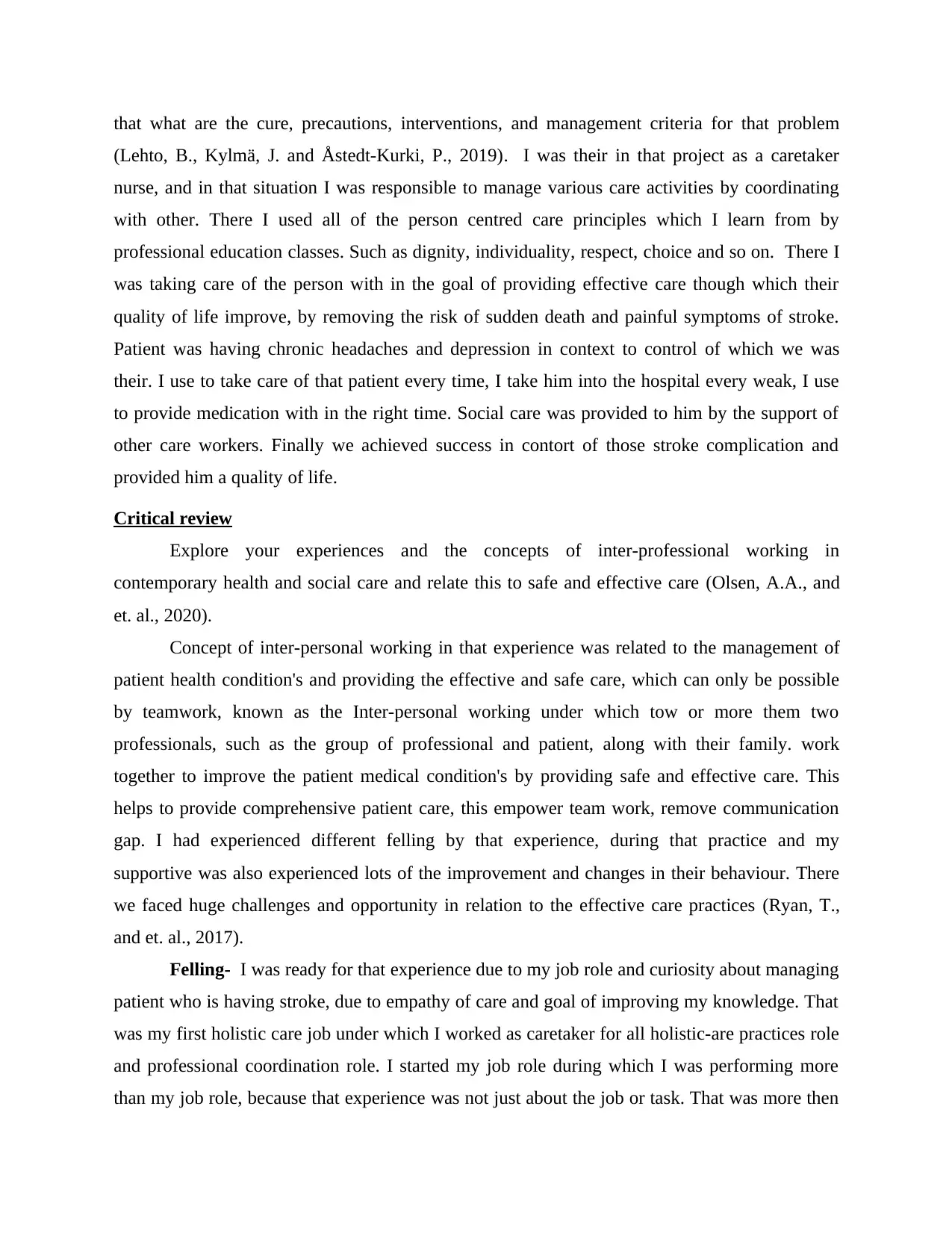
that what are the cure, precautions, interventions, and management criteria for that problem
(Lehto, B., Kylmä, J. and Åstedt‐Kurki, P., 2019). I was their in that project as a caretaker
nurse, and in that situation I was responsible to manage various care activities by coordinating
with other. There I used all of the person centred care principles which I learn from by
professional education classes. Such as dignity, individuality, respect, choice and so on. There I
was taking care of the person with in the goal of providing effective care though which their
quality of life improve, by removing the risk of sudden death and painful symptoms of stroke.
Patient was having chronic headaches and depression in context to control of which we was
their. I use to take care of that patient every time, I take him into the hospital every weak, I use
to provide medication with in the right time. Social care was provided to him by the support of
other care workers. Finally we achieved success in contort of those stroke complication and
provided him a quality of life.
Critical review
Explore your experiences and the concepts of inter-professional working in
contemporary health and social care and relate this to safe and effective care (Olsen, A.A., and
et. al., 2020).
Concept of inter-personal working in that experience was related to the management of
patient health condition's and providing the effective and safe care, which can only be possible
by teamwork, known as the Inter-personal working under which tow or more them two
professionals, such as the group of professional and patient, along with their family. work
together to improve the patient medical condition's by providing safe and effective care. This
helps to provide comprehensive patient care, this empower team work, remove communication
gap. I had experienced different felling by that experience, during that practice and my
supportive was also experienced lots of the improvement and changes in their behaviour. There
we faced huge challenges and opportunity in relation to the effective care practices (Ryan, T.,
and et. al., 2017).
Felling- I was ready for that experience due to my job role and curiosity about managing
patient who is having stroke, due to empathy of care and goal of improving my knowledge. That
was my first holistic care job under which I worked as caretaker for all holistic-are practices role
and professional coordination role. I started my job role during which I was performing more
than my job role, because that experience was not just about the job or task. That was more then
(Lehto, B., Kylmä, J. and Åstedt‐Kurki, P., 2019). I was their in that project as a caretaker
nurse, and in that situation I was responsible to manage various care activities by coordinating
with other. There I used all of the person centred care principles which I learn from by
professional education classes. Such as dignity, individuality, respect, choice and so on. There I
was taking care of the person with in the goal of providing effective care though which their
quality of life improve, by removing the risk of sudden death and painful symptoms of stroke.
Patient was having chronic headaches and depression in context to control of which we was
their. I use to take care of that patient every time, I take him into the hospital every weak, I use
to provide medication with in the right time. Social care was provided to him by the support of
other care workers. Finally we achieved success in contort of those stroke complication and
provided him a quality of life.
Critical review
Explore your experiences and the concepts of inter-professional working in
contemporary health and social care and relate this to safe and effective care (Olsen, A.A., and
et. al., 2020).
Concept of inter-personal working in that experience was related to the management of
patient health condition's and providing the effective and safe care, which can only be possible
by teamwork, known as the Inter-personal working under which tow or more them two
professionals, such as the group of professional and patient, along with their family. work
together to improve the patient medical condition's by providing safe and effective care. This
helps to provide comprehensive patient care, this empower team work, remove communication
gap. I had experienced different felling by that experience, during that practice and my
supportive was also experienced lots of the improvement and changes in their behaviour. There
we faced huge challenges and opportunity in relation to the effective care practices (Ryan, T.,
and et. al., 2017).
Felling- I was ready for that experience due to my job role and curiosity about managing
patient who is having stroke, due to empathy of care and goal of improving my knowledge. That
was my first holistic care job under which I worked as caretaker for all holistic-are practices role
and professional coordination role. I started my job role during which I was performing more
than my job role, because that experience was not just about the job or task. That was more then
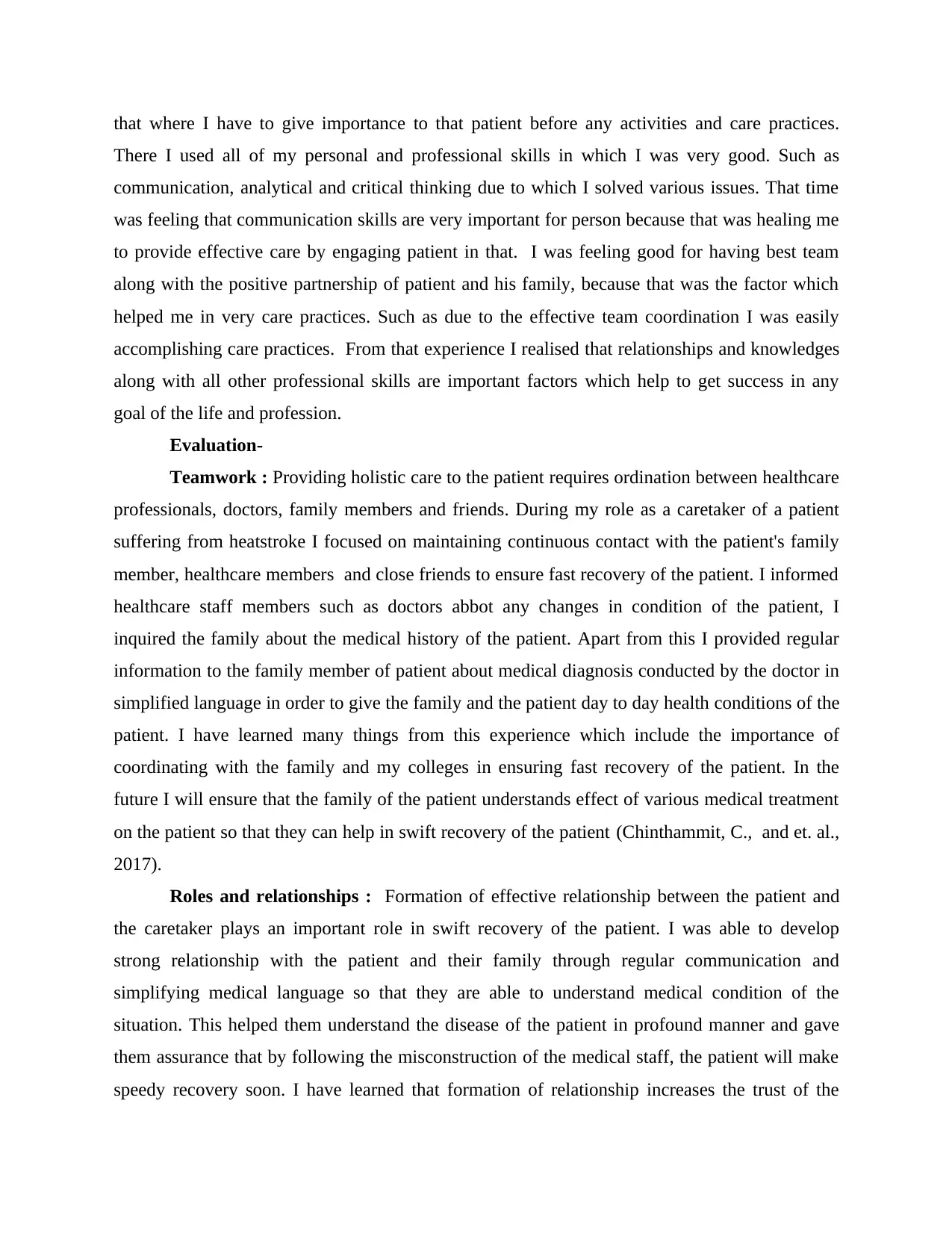
that where I have to give importance to that patient before any activities and care practices.
There I used all of my personal and professional skills in which I was very good. Such as
communication, analytical and critical thinking due to which I solved various issues. That time
was feeling that communication skills are very important for person because that was healing me
to provide effective care by engaging patient in that. I was feeling good for having best team
along with the positive partnership of patient and his family, because that was the factor which
helped me in very care practices. Such as due to the effective team coordination I was easily
accomplishing care practices. From that experience I realised that relationships and knowledges
along with all other professional skills are important factors which help to get success in any
goal of the life and profession.
Evaluation-
Teamwork : Providing holistic care to the patient requires ordination between healthcare
professionals, doctors, family members and friends. During my role as a caretaker of a patient
suffering from heatstroke I focused on maintaining continuous contact with the patient's family
member, healthcare members and close friends to ensure fast recovery of the patient. I informed
healthcare staff members such as doctors abbot any changes in condition of the patient, I
inquired the family about the medical history of the patient. Apart from this I provided regular
information to the family member of patient about medical diagnosis conducted by the doctor in
simplified language in order to give the family and the patient day to day health conditions of the
patient. I have learned many things from this experience which include the importance of
coordinating with the family and my colleges in ensuring fast recovery of the patient. In the
future I will ensure that the family of the patient understands effect of various medical treatment
on the patient so that they can help in swift recovery of the patient (Chinthammit, C., and et. al.,
2017).
Roles and relationships : Formation of effective relationship between the patient and
the caretaker plays an important role in swift recovery of the patient. I was able to develop
strong relationship with the patient and their family through regular communication and
simplifying medical language so that they are able to understand medical condition of the
situation. This helped them understand the disease of the patient in profound manner and gave
them assurance that by following the misconstruction of the medical staff, the patient will make
speedy recovery soon. I have learned that formation of relationship increases the trust of the
There I used all of my personal and professional skills in which I was very good. Such as
communication, analytical and critical thinking due to which I solved various issues. That time
was feeling that communication skills are very important for person because that was healing me
to provide effective care by engaging patient in that. I was feeling good for having best team
along with the positive partnership of patient and his family, because that was the factor which
helped me in very care practices. Such as due to the effective team coordination I was easily
accomplishing care practices. From that experience I realised that relationships and knowledges
along with all other professional skills are important factors which help to get success in any
goal of the life and profession.
Evaluation-
Teamwork : Providing holistic care to the patient requires ordination between healthcare
professionals, doctors, family members and friends. During my role as a caretaker of a patient
suffering from heatstroke I focused on maintaining continuous contact with the patient's family
member, healthcare members and close friends to ensure fast recovery of the patient. I informed
healthcare staff members such as doctors abbot any changes in condition of the patient, I
inquired the family about the medical history of the patient. Apart from this I provided regular
information to the family member of patient about medical diagnosis conducted by the doctor in
simplified language in order to give the family and the patient day to day health conditions of the
patient. I have learned many things from this experience which include the importance of
coordinating with the family and my colleges in ensuring fast recovery of the patient. In the
future I will ensure that the family of the patient understands effect of various medical treatment
on the patient so that they can help in swift recovery of the patient (Chinthammit, C., and et. al.,
2017).
Roles and relationships : Formation of effective relationship between the patient and
the caretaker plays an important role in swift recovery of the patient. I was able to develop
strong relationship with the patient and their family through regular communication and
simplifying medical language so that they are able to understand medical condition of the
situation. This helped them understand the disease of the patient in profound manner and gave
them assurance that by following the misconstruction of the medical staff, the patient will make
speedy recovery soon. I have learned that formation of relationship increases the trust of the
⊘ This is a preview!⊘
Do you want full access?
Subscribe today to unlock all pages.

Trusted by 1+ million students worldwide
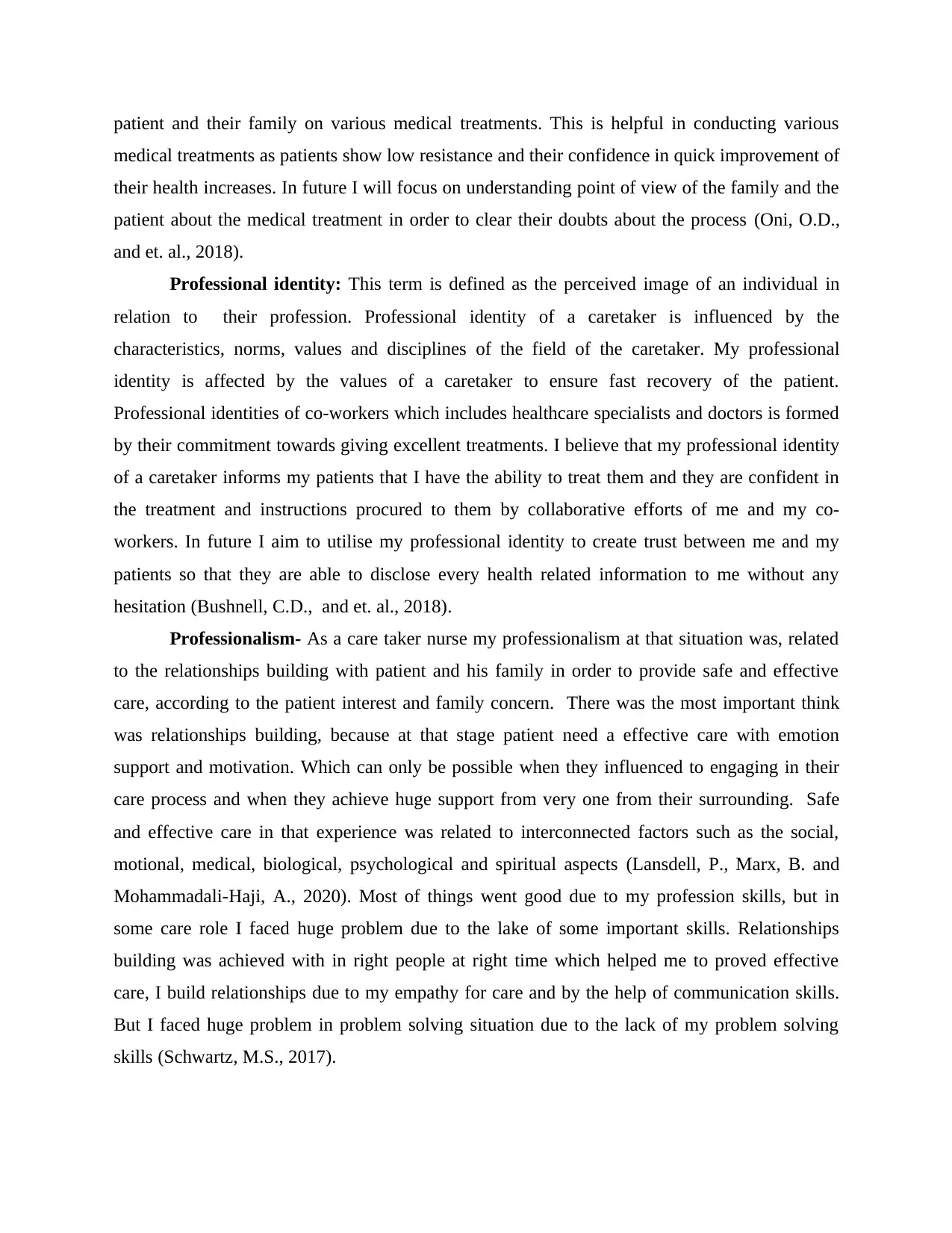
patient and their family on various medical treatments. This is helpful in conducting various
medical treatments as patients show low resistance and their confidence in quick improvement of
their health increases. In future I will focus on understanding point of view of the family and the
patient about the medical treatment in order to clear their doubts about the process (Oni, O.D.,
and et. al., 2018).
Professional identity: This term is defined as the perceived image of an individual in
relation to their profession. Professional identity of a caretaker is influenced by the
characteristics, norms, values and disciplines of the field of the caretaker. My professional
identity is affected by the values of a caretaker to ensure fast recovery of the patient.
Professional identities of co-workers which includes healthcare specialists and doctors is formed
by their commitment towards giving excellent treatments. I believe that my professional identity
of a caretaker informs my patients that I have the ability to treat them and they are confident in
the treatment and instructions procured to them by collaborative efforts of me and my co-
workers. In future I aim to utilise my professional identity to create trust between me and my
patients so that they are able to disclose every health related information to me without any
hesitation (Bushnell, C.D., and et. al., 2018).
Professionalism- As a care taker nurse my professionalism at that situation was, related
to the relationships building with patient and his family in order to provide safe and effective
care, according to the patient interest and family concern. There was the most important think
was relationships building, because at that stage patient need a effective care with emotion
support and motivation. Which can only be possible when they influenced to engaging in their
care process and when they achieve huge support from very one from their surrounding. Safe
and effective care in that experience was related to interconnected factors such as the social,
motional, medical, biological, psychological and spiritual aspects (Lansdell, P., Marx, B. and
Mohammadali-Haji, A., 2020). Most of things went good due to my profession skills, but in
some care role I faced huge problem due to the lake of some important skills. Relationships
building was achieved with in right people at right time which helped me to proved effective
care, I build relationships due to my empathy for care and by the help of communication skills.
But I faced huge problem in problem solving situation due to the lack of my problem solving
skills (Schwartz, M.S., 2017).
medical treatments as patients show low resistance and their confidence in quick improvement of
their health increases. In future I will focus on understanding point of view of the family and the
patient about the medical treatment in order to clear their doubts about the process (Oni, O.D.,
and et. al., 2018).
Professional identity: This term is defined as the perceived image of an individual in
relation to their profession. Professional identity of a caretaker is influenced by the
characteristics, norms, values and disciplines of the field of the caretaker. My professional
identity is affected by the values of a caretaker to ensure fast recovery of the patient.
Professional identities of co-workers which includes healthcare specialists and doctors is formed
by their commitment towards giving excellent treatments. I believe that my professional identity
of a caretaker informs my patients that I have the ability to treat them and they are confident in
the treatment and instructions procured to them by collaborative efforts of me and my co-
workers. In future I aim to utilise my professional identity to create trust between me and my
patients so that they are able to disclose every health related information to me without any
hesitation (Bushnell, C.D., and et. al., 2018).
Professionalism- As a care taker nurse my professionalism at that situation was, related
to the relationships building with patient and his family in order to provide safe and effective
care, according to the patient interest and family concern. There was the most important think
was relationships building, because at that stage patient need a effective care with emotion
support and motivation. Which can only be possible when they influenced to engaging in their
care process and when they achieve huge support from very one from their surrounding. Safe
and effective care in that experience was related to interconnected factors such as the social,
motional, medical, biological, psychological and spiritual aspects (Lansdell, P., Marx, B. and
Mohammadali-Haji, A., 2020). Most of things went good due to my profession skills, but in
some care role I faced huge problem due to the lake of some important skills. Relationships
building was achieved with in right people at right time which helped me to proved effective
care, I build relationships due to my empathy for care and by the help of communication skills.
But I faced huge problem in problem solving situation due to the lack of my problem solving
skills (Schwartz, M.S., 2017).
Paraphrase This Document
Need a fresh take? Get an instant paraphrase of this document with our AI Paraphraser
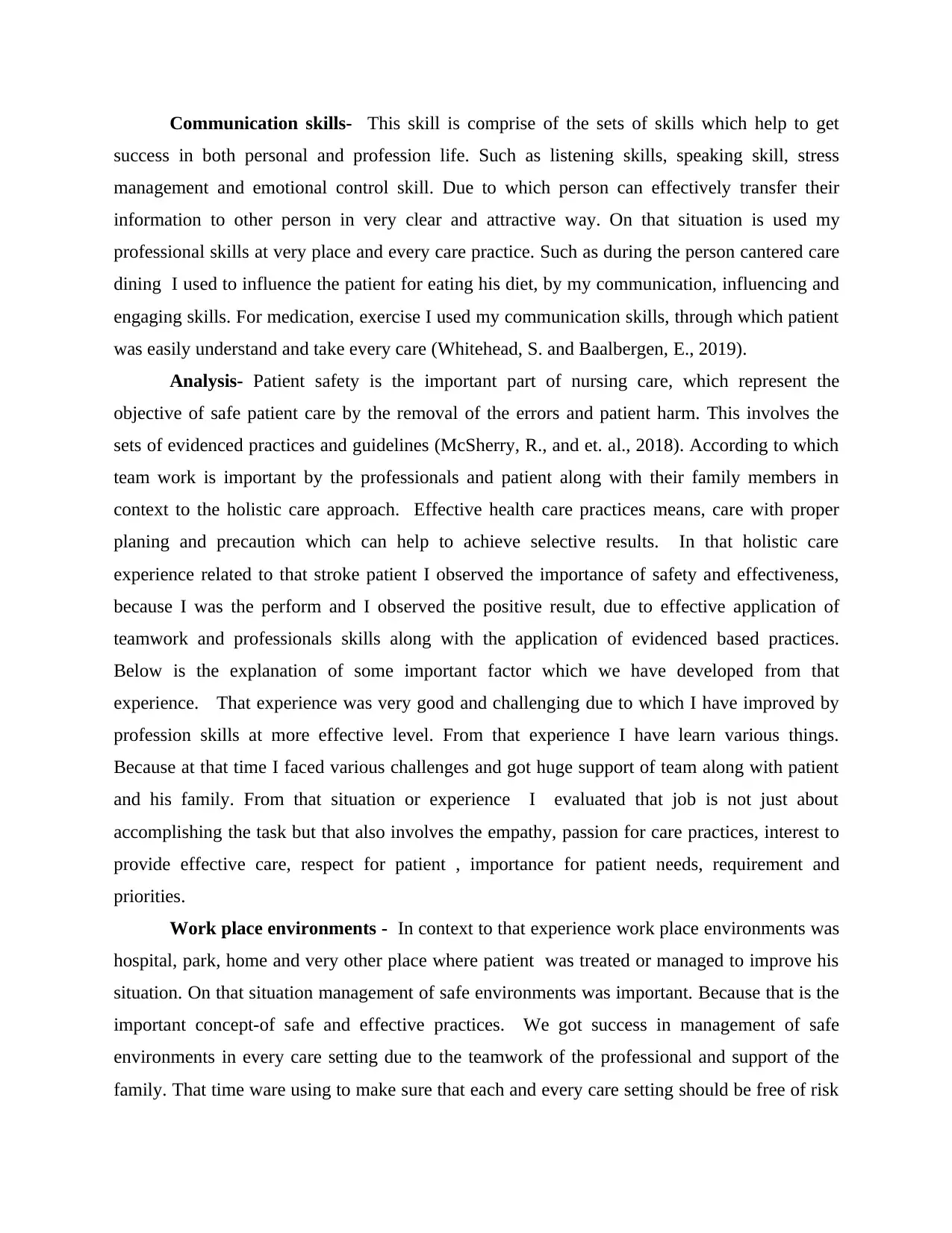
Communication skills- This skill is comprise of the sets of skills which help to get
success in both personal and profession life. Such as listening skills, speaking skill, stress
management and emotional control skill. Due to which person can effectively transfer their
information to other person in very clear and attractive way. On that situation is used my
professional skills at very place and every care practice. Such as during the person cantered care
dining I used to influence the patient for eating his diet, by my communication, influencing and
engaging skills. For medication, exercise I used my communication skills, through which patient
was easily understand and take every care (Whitehead, S. and Baalbergen, E., 2019).
Analysis- Patient safety is the important part of nursing care, which represent the
objective of safe patient care by the removal of the errors and patient harm. This involves the
sets of evidenced practices and guidelines (McSherry, R., and et. al., 2018). According to which
team work is important by the professionals and patient along with their family members in
context to the holistic care approach. Effective health care practices means, care with proper
planing and precaution which can help to achieve selective results. In that holistic care
experience related to that stroke patient I observed the importance of safety and effectiveness,
because I was the perform and I observed the positive result, due to effective application of
teamwork and professionals skills along with the application of evidenced based practices.
Below is the explanation of some important factor which we have developed from that
experience. That experience was very good and challenging due to which I have improved by
profession skills at more effective level. From that experience I have learn various things.
Because at that time I faced various challenges and got huge support of team along with patient
and his family. From that situation or experience I evaluated that job is not just about
accomplishing the task but that also involves the empathy, passion for care practices, interest to
provide effective care, respect for patient , importance for patient needs, requirement and
priorities.
Work place environments - In context to that experience work place environments was
hospital, park, home and very other place where patient was treated or managed to improve his
situation. On that situation management of safe environments was important. Because that is the
important concept-of safe and effective practices. We got success in management of safe
environments in every care setting due to the teamwork of the professional and support of the
family. That time ware using to make sure that each and every care setting should be free of risk
success in both personal and profession life. Such as listening skills, speaking skill, stress
management and emotional control skill. Due to which person can effectively transfer their
information to other person in very clear and attractive way. On that situation is used my
professional skills at very place and every care practice. Such as during the person cantered care
dining I used to influence the patient for eating his diet, by my communication, influencing and
engaging skills. For medication, exercise I used my communication skills, through which patient
was easily understand and take every care (Whitehead, S. and Baalbergen, E., 2019).
Analysis- Patient safety is the important part of nursing care, which represent the
objective of safe patient care by the removal of the errors and patient harm. This involves the
sets of evidenced practices and guidelines (McSherry, R., and et. al., 2018). According to which
team work is important by the professionals and patient along with their family members in
context to the holistic care approach. Effective health care practices means, care with proper
planing and precaution which can help to achieve selective results. In that holistic care
experience related to that stroke patient I observed the importance of safety and effectiveness,
because I was the perform and I observed the positive result, due to effective application of
teamwork and professionals skills along with the application of evidenced based practices.
Below is the explanation of some important factor which we have developed from that
experience. That experience was very good and challenging due to which I have improved by
profession skills at more effective level. From that experience I have learn various things.
Because at that time I faced various challenges and got huge support of team along with patient
and his family. From that situation or experience I evaluated that job is not just about
accomplishing the task but that also involves the empathy, passion for care practices, interest to
provide effective care, respect for patient , importance for patient needs, requirement and
priorities.
Work place environments - In context to that experience work place environments was
hospital, park, home and very other place where patient was treated or managed to improve his
situation. On that situation management of safe environments was important. Because that is the
important concept-of safe and effective practices. We got success in management of safe
environments in every care setting due to the teamwork of the professional and support of the
family. That time ware using to make sure that each and every care setting should be free of risk
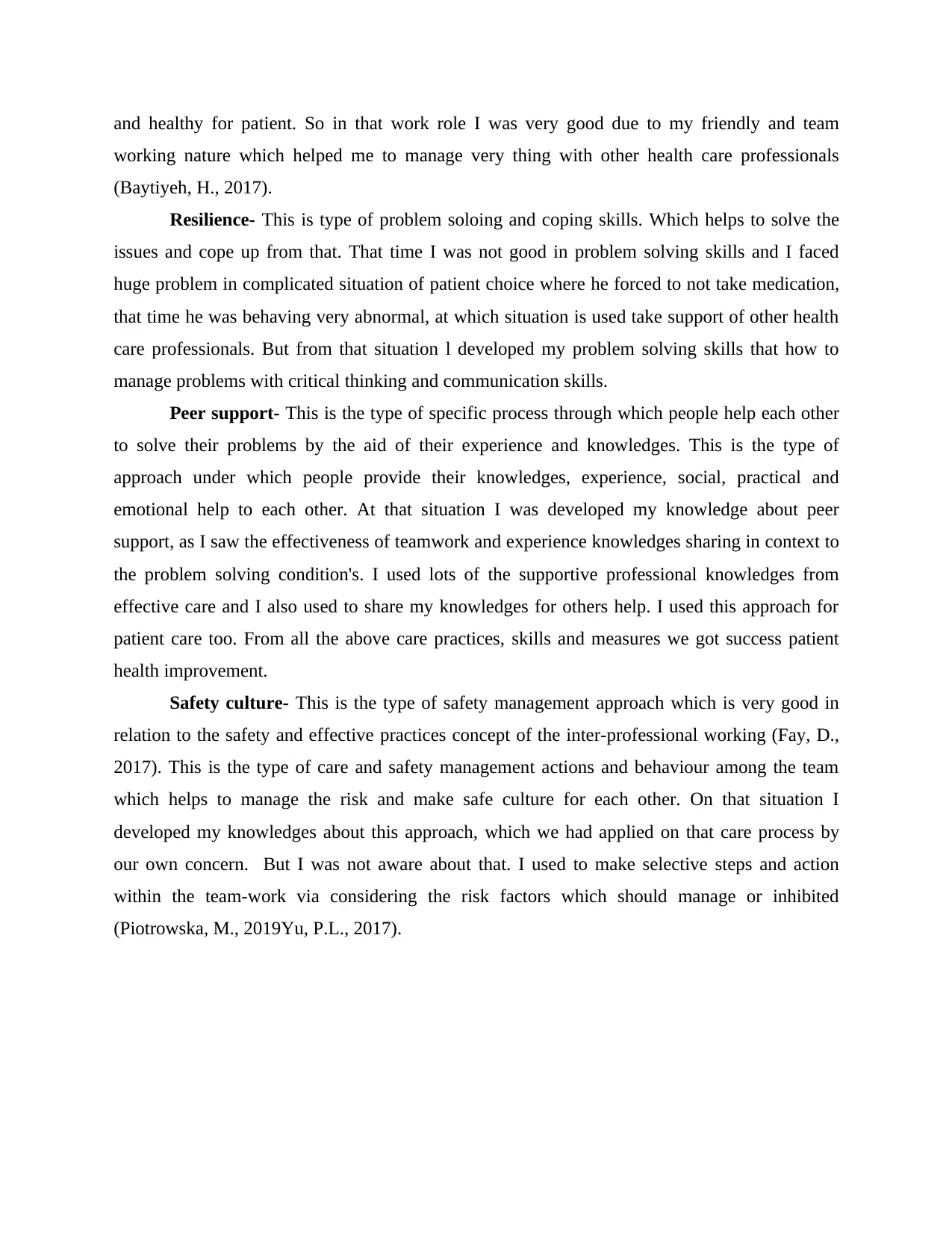
and healthy for patient. So in that work role I was very good due to my friendly and team
working nature which helped me to manage very thing with other health care professionals
(Baytiyeh, H., 2017).
Resilience- This is type of problem soloing and coping skills. Which helps to solve the
issues and cope up from that. That time I was not good in problem solving skills and I faced
huge problem in complicated situation of patient choice where he forced to not take medication,
that time he was behaving very abnormal, at which situation is used take support of other health
care professionals. But from that situation l developed my problem solving skills that how to
manage problems with critical thinking and communication skills.
Peer support- This is the type of specific process through which people help each other
to solve their problems by the aid of their experience and knowledges. This is the type of
approach under which people provide their knowledges, experience, social, practical and
emotional help to each other. At that situation I was developed my knowledge about peer
support, as I saw the effectiveness of teamwork and experience knowledges sharing in context to
the problem solving condition's. I used lots of the supportive professional knowledges from
effective care and I also used to share my knowledges for others help. I used this approach for
patient care too. From all the above care practices, skills and measures we got success patient
health improvement.
Safety culture- This is the type of safety management approach which is very good in
relation to the safety and effective practices concept of the inter-professional working (Fay, D.,
2017). This is the type of care and safety management actions and behaviour among the team
which helps to manage the risk and make safe culture for each other. On that situation I
developed my knowledges about this approach, which we had applied on that care process by
our own concern. But I was not aware about that. I used to make selective steps and action
within the team-work via considering the risk factors which should manage or inhibited
(Piotrowska, M., 2019Yu, P.L., 2017).
working nature which helped me to manage very thing with other health care professionals
(Baytiyeh, H., 2017).
Resilience- This is type of problem soloing and coping skills. Which helps to solve the
issues and cope up from that. That time I was not good in problem solving skills and I faced
huge problem in complicated situation of patient choice where he forced to not take medication,
that time he was behaving very abnormal, at which situation is used take support of other health
care professionals. But from that situation l developed my problem solving skills that how to
manage problems with critical thinking and communication skills.
Peer support- This is the type of specific process through which people help each other
to solve their problems by the aid of their experience and knowledges. This is the type of
approach under which people provide their knowledges, experience, social, practical and
emotional help to each other. At that situation I was developed my knowledge about peer
support, as I saw the effectiveness of teamwork and experience knowledges sharing in context to
the problem solving condition's. I used lots of the supportive professional knowledges from
effective care and I also used to share my knowledges for others help. I used this approach for
patient care too. From all the above care practices, skills and measures we got success patient
health improvement.
Safety culture- This is the type of safety management approach which is very good in
relation to the safety and effective practices concept of the inter-professional working (Fay, D.,
2017). This is the type of care and safety management actions and behaviour among the team
which helps to manage the risk and make safe culture for each other. On that situation I
developed my knowledges about this approach, which we had applied on that care process by
our own concern. But I was not aware about that. I used to make selective steps and action
within the team-work via considering the risk factors which should manage or inhibited
(Piotrowska, M., 2019Yu, P.L., 2017).
⊘ This is a preview!⊘
Do you want full access?
Subscribe today to unlock all pages.

Trusted by 1+ million students worldwide
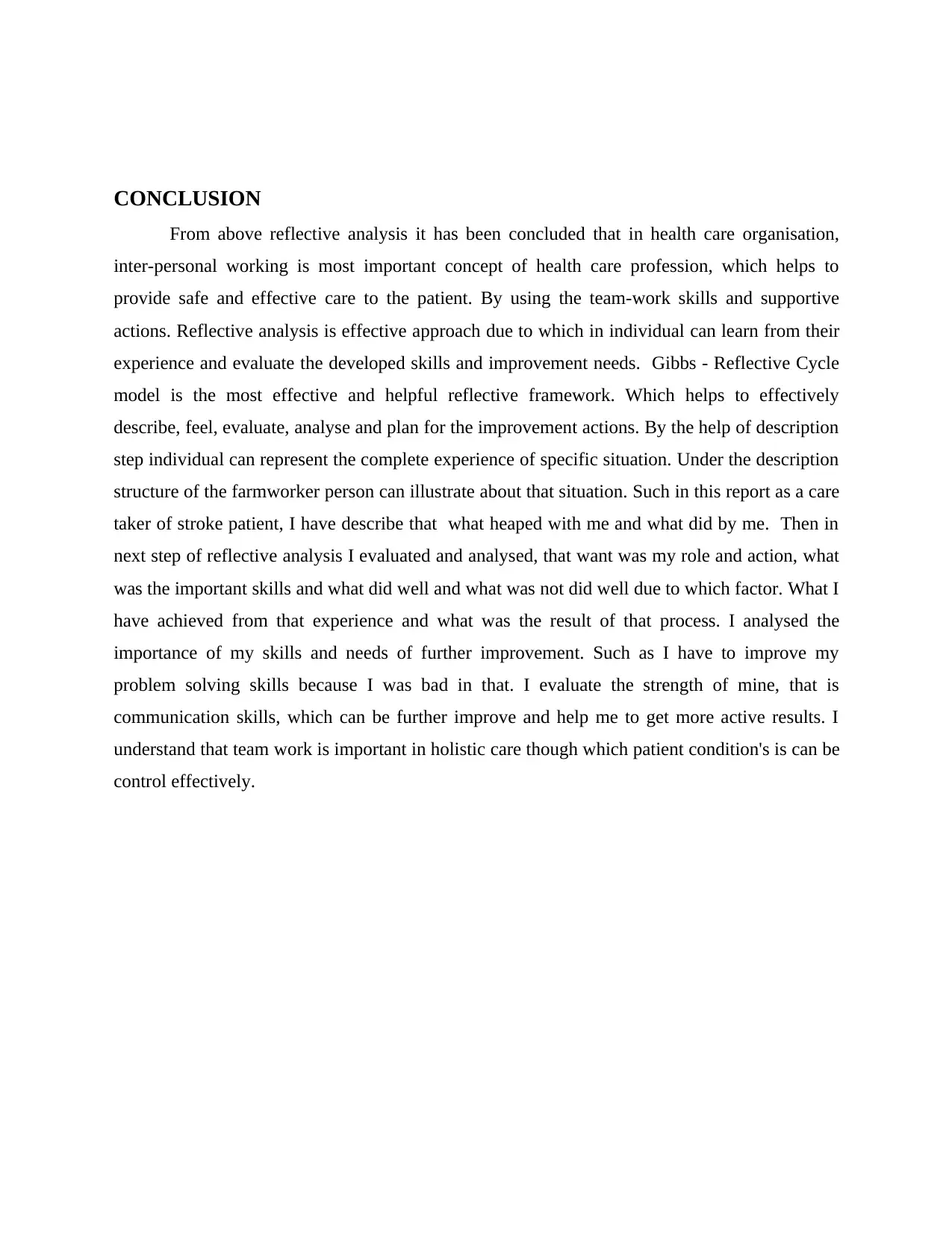
CONCLUSION
From above reflective analysis it has been concluded that in health care organisation,
inter-personal working is most important concept of health care profession, which helps to
provide safe and effective care to the patient. By using the team-work skills and supportive
actions. Reflective analysis is effective approach due to which in individual can learn from their
experience and evaluate the developed skills and improvement needs. Gibbs - Reflective Cycle
model is the most effective and helpful reflective framework. Which helps to effectively
describe, feel, evaluate, analyse and plan for the improvement actions. By the help of description
step individual can represent the complete experience of specific situation. Under the description
structure of the farmworker person can illustrate about that situation. Such in this report as a care
taker of stroke patient, I have describe that what heaped with me and what did by me. Then in
next step of reflective analysis I evaluated and analysed, that want was my role and action, what
was the important skills and what did well and what was not did well due to which factor. What I
have achieved from that experience and what was the result of that process. I analysed the
importance of my skills and needs of further improvement. Such as I have to improve my
problem solving skills because I was bad in that. I evaluate the strength of mine, that is
communication skills, which can be further improve and help me to get more active results. I
understand that team work is important in holistic care though which patient condition's is can be
control effectively.
From above reflective analysis it has been concluded that in health care organisation,
inter-personal working is most important concept of health care profession, which helps to
provide safe and effective care to the patient. By using the team-work skills and supportive
actions. Reflective analysis is effective approach due to which in individual can learn from their
experience and evaluate the developed skills and improvement needs. Gibbs - Reflective Cycle
model is the most effective and helpful reflective framework. Which helps to effectively
describe, feel, evaluate, analyse and plan for the improvement actions. By the help of description
step individual can represent the complete experience of specific situation. Under the description
structure of the farmworker person can illustrate about that situation. Such in this report as a care
taker of stroke patient, I have describe that what heaped with me and what did by me. Then in
next step of reflective analysis I evaluated and analysed, that want was my role and action, what
was the important skills and what did well and what was not did well due to which factor. What I
have achieved from that experience and what was the result of that process. I analysed the
importance of my skills and needs of further improvement. Such as I have to improve my
problem solving skills because I was bad in that. I evaluate the strength of mine, that is
communication skills, which can be further improve and help me to get more active results. I
understand that team work is important in holistic care though which patient condition's is can be
control effectively.
Paraphrase This Document
Need a fresh take? Get an instant paraphrase of this document with our AI Paraphraser
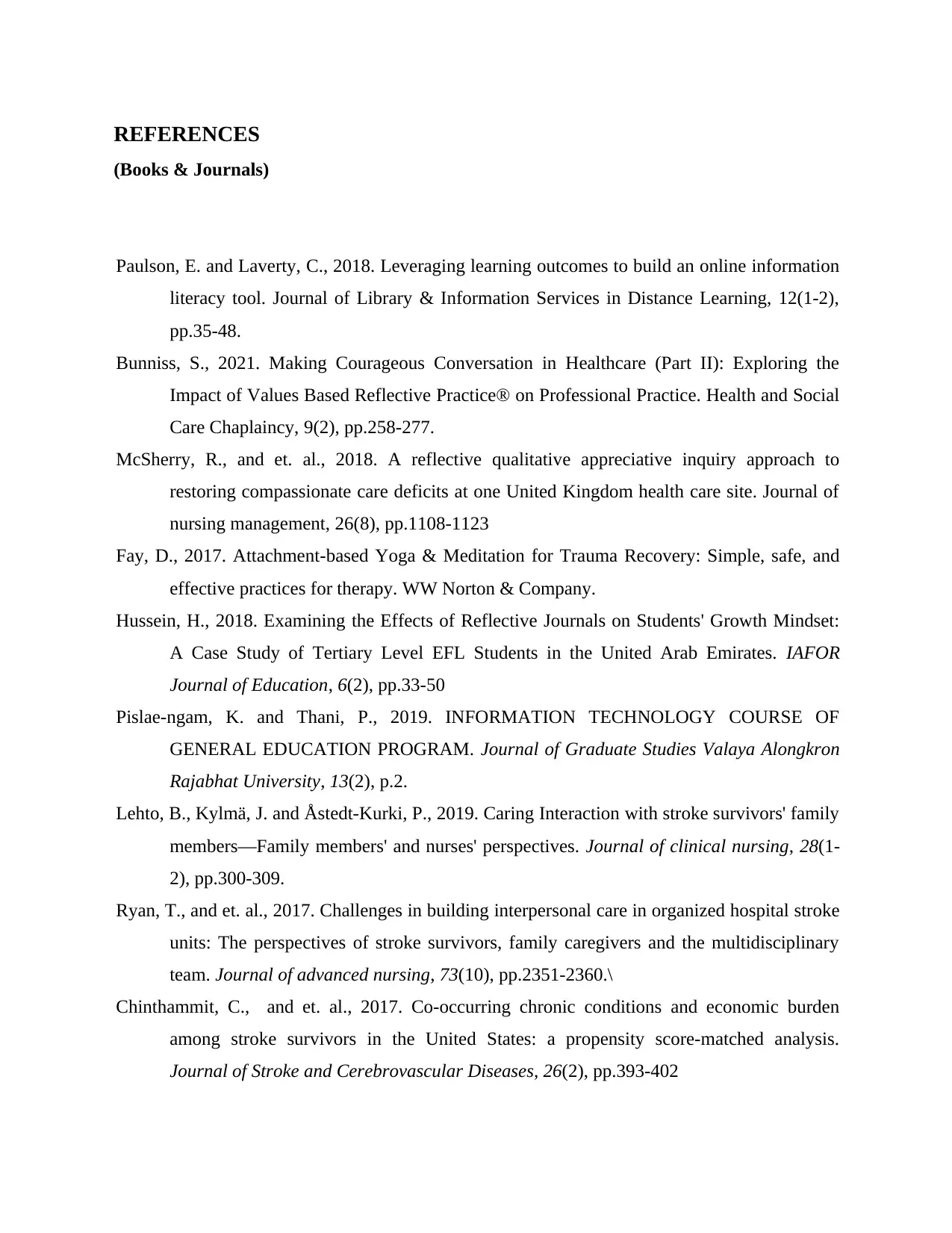
REFERENCES
(Books & Journals)
Paulson, E. and Laverty, C., 2018. Leveraging learning outcomes to build an online information
literacy tool. Journal of Library & Information Services in Distance Learning, 12(1-2),
pp.35-48.
Bunniss, S., 2021. Making Courageous Conversation in Healthcare (Part II): Exploring the
Impact of Values Based Reflective Practice® on Professional Practice. Health and Social
Care Chaplaincy, 9(2), pp.258-277.
McSherry, R., and et. al., 2018. A reflective qualitative appreciative inquiry approach to
restoring compassionate care deficits at one United Kingdom health care site. Journal of
nursing management, 26(8), pp.1108-1123
Fay, D., 2017. Attachment-based Yoga & Meditation for Trauma Recovery: Simple, safe, and
effective practices for therapy. WW Norton & Company.
Hussein, H., 2018. Examining the Effects of Reflective Journals on Students' Growth Mindset:
A Case Study of Tertiary Level EFL Students in the United Arab Emirates. IAFOR
Journal of Education, 6(2), pp.33-50
Pislae-ngam, K. and Thani, P., 2019. INFORMATION TECHNOLOGY COURSE OF
GENERAL EDUCATION PROGRAM. Journal of Graduate Studies Valaya Alongkron
Rajabhat University, 13(2), p.2.
Lehto, B., Kylmä, J. and Åstedt‐Kurki, P., 2019. Caring Interaction with stroke survivors' family
members—Family members' and nurses' perspectives. Journal of clinical nursing, 28(1-
2), pp.300-309.
Ryan, T., and et. al., 2017. Challenges in building interpersonal care in organized hospital stroke
units: The perspectives of stroke survivors, family caregivers and the multidisciplinary
team. Journal of advanced nursing, 73(10), pp.2351-2360.\
Chinthammit, C., and et. al., 2017. Co-occurring chronic conditions and economic burden
among stroke survivors in the United States: a propensity score-matched analysis.
Journal of Stroke and Cerebrovascular Diseases, 26(2), pp.393-402
(Books & Journals)
Paulson, E. and Laverty, C., 2018. Leveraging learning outcomes to build an online information
literacy tool. Journal of Library & Information Services in Distance Learning, 12(1-2),
pp.35-48.
Bunniss, S., 2021. Making Courageous Conversation in Healthcare (Part II): Exploring the
Impact of Values Based Reflective Practice® on Professional Practice. Health and Social
Care Chaplaincy, 9(2), pp.258-277.
McSherry, R., and et. al., 2018. A reflective qualitative appreciative inquiry approach to
restoring compassionate care deficits at one United Kingdom health care site. Journal of
nursing management, 26(8), pp.1108-1123
Fay, D., 2017. Attachment-based Yoga & Meditation for Trauma Recovery: Simple, safe, and
effective practices for therapy. WW Norton & Company.
Hussein, H., 2018. Examining the Effects of Reflective Journals on Students' Growth Mindset:
A Case Study of Tertiary Level EFL Students in the United Arab Emirates. IAFOR
Journal of Education, 6(2), pp.33-50
Pislae-ngam, K. and Thani, P., 2019. INFORMATION TECHNOLOGY COURSE OF
GENERAL EDUCATION PROGRAM. Journal of Graduate Studies Valaya Alongkron
Rajabhat University, 13(2), p.2.
Lehto, B., Kylmä, J. and Åstedt‐Kurki, P., 2019. Caring Interaction with stroke survivors' family
members—Family members' and nurses' perspectives. Journal of clinical nursing, 28(1-
2), pp.300-309.
Ryan, T., and et. al., 2017. Challenges in building interpersonal care in organized hospital stroke
units: The perspectives of stroke survivors, family caregivers and the multidisciplinary
team. Journal of advanced nursing, 73(10), pp.2351-2360.\
Chinthammit, C., and et. al., 2017. Co-occurring chronic conditions and economic burden
among stroke survivors in the United States: a propensity score-matched analysis.
Journal of Stroke and Cerebrovascular Diseases, 26(2), pp.393-402
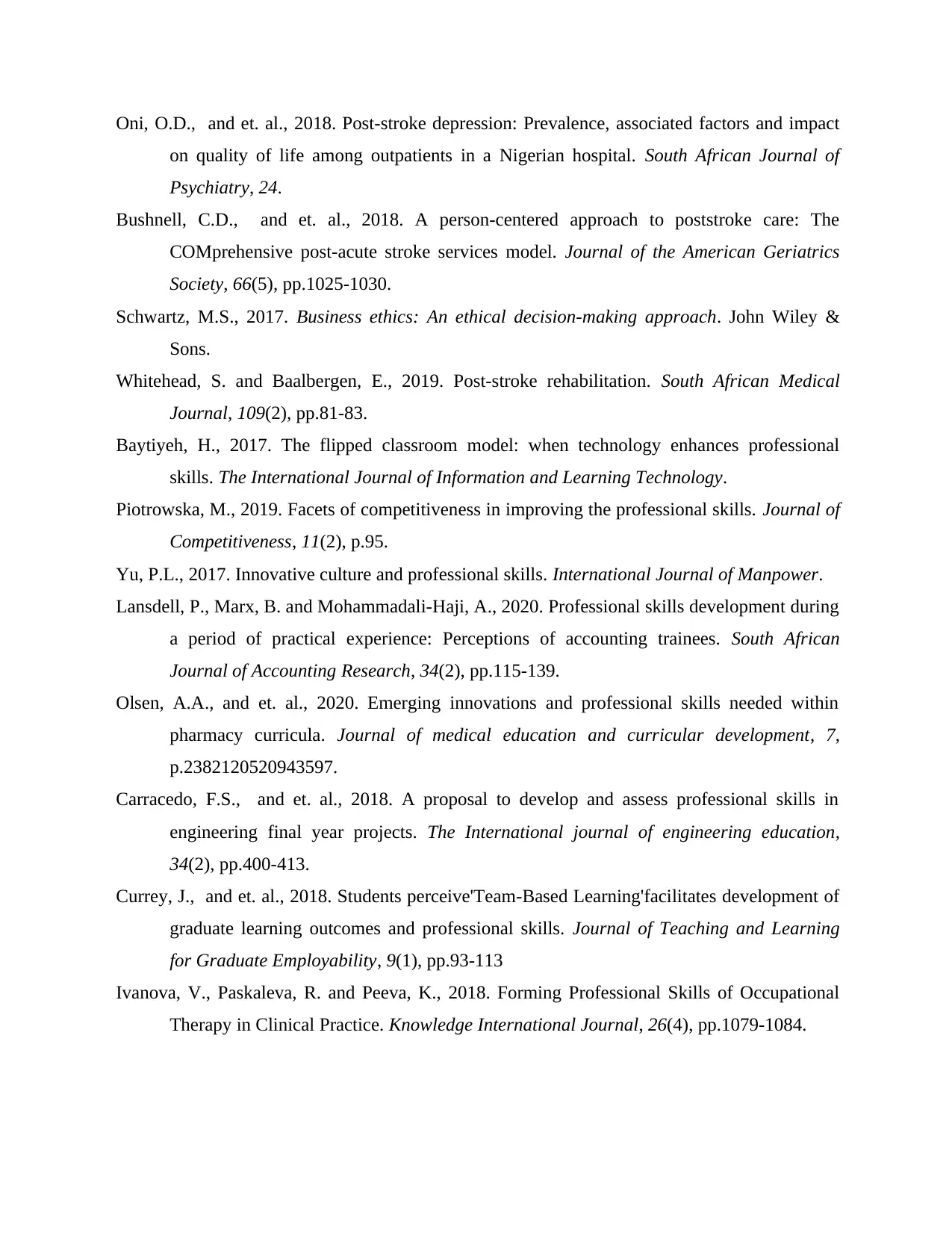
Oni, O.D., and et. al., 2018. Post-stroke depression: Prevalence, associated factors and impact
on quality of life among outpatients in a Nigerian hospital. South African Journal of
Psychiatry, 24.
Bushnell, C.D., and et. al., 2018. A person‐centered approach to poststroke care: The
COMprehensive post‐acute stroke services model. Journal of the American Geriatrics
Society, 66(5), pp.1025-1030.
Schwartz, M.S., 2017. Business ethics: An ethical decision-making approach. John Wiley &
Sons.
Whitehead, S. and Baalbergen, E., 2019. Post-stroke rehabilitation. South African Medical
Journal, 109(2), pp.81-83.
Baytiyeh, H., 2017. The flipped classroom model: when technology enhances professional
skills. The International Journal of Information and Learning Technology.
Piotrowska, M., 2019. Facets of competitiveness in improving the professional skills. Journal of
Competitiveness, 11(2), p.95.
Yu, P.L., 2017. Innovative culture and professional skills. International Journal of Manpower.
Lansdell, P., Marx, B. and Mohammadali-Haji, A., 2020. Professional skills development during
a period of practical experience: Perceptions of accounting trainees. South African
Journal of Accounting Research, 34(2), pp.115-139.
Olsen, A.A., and et. al., 2020. Emerging innovations and professional skills needed within
pharmacy curricula. Journal of medical education and curricular development, 7,
p.2382120520943597.
Carracedo, F.S., and et. al., 2018. A proposal to develop and assess professional skills in
engineering final year projects. The International journal of engineering education,
34(2), pp.400-413.
Currey, J., and et. al., 2018. Students perceive'Team-Based Learning'facilitates development of
graduate learning outcomes and professional skills. Journal of Teaching and Learning
for Graduate Employability, 9(1), pp.93-113
Ivanova, V., Paskaleva, R. and Peeva, K., 2018. Forming Professional Skills of Occupational
Therapy in Clinical Practice. Knowledge International Journal, 26(4), pp.1079-1084.
on quality of life among outpatients in a Nigerian hospital. South African Journal of
Psychiatry, 24.
Bushnell, C.D., and et. al., 2018. A person‐centered approach to poststroke care: The
COMprehensive post‐acute stroke services model. Journal of the American Geriatrics
Society, 66(5), pp.1025-1030.
Schwartz, M.S., 2017. Business ethics: An ethical decision-making approach. John Wiley &
Sons.
Whitehead, S. and Baalbergen, E., 2019. Post-stroke rehabilitation. South African Medical
Journal, 109(2), pp.81-83.
Baytiyeh, H., 2017. The flipped classroom model: when technology enhances professional
skills. The International Journal of Information and Learning Technology.
Piotrowska, M., 2019. Facets of competitiveness in improving the professional skills. Journal of
Competitiveness, 11(2), p.95.
Yu, P.L., 2017. Innovative culture and professional skills. International Journal of Manpower.
Lansdell, P., Marx, B. and Mohammadali-Haji, A., 2020. Professional skills development during
a period of practical experience: Perceptions of accounting trainees. South African
Journal of Accounting Research, 34(2), pp.115-139.
Olsen, A.A., and et. al., 2020. Emerging innovations and professional skills needed within
pharmacy curricula. Journal of medical education and curricular development, 7,
p.2382120520943597.
Carracedo, F.S., and et. al., 2018. A proposal to develop and assess professional skills in
engineering final year projects. The International journal of engineering education,
34(2), pp.400-413.
Currey, J., and et. al., 2018. Students perceive'Team-Based Learning'facilitates development of
graduate learning outcomes and professional skills. Journal of Teaching and Learning
for Graduate Employability, 9(1), pp.93-113
Ivanova, V., Paskaleva, R. and Peeva, K., 2018. Forming Professional Skills of Occupational
Therapy in Clinical Practice. Knowledge International Journal, 26(4), pp.1079-1084.
⊘ This is a preview!⊘
Do you want full access?
Subscribe today to unlock all pages.

Trusted by 1+ million students worldwide
1 out of 13
Related Documents
Your All-in-One AI-Powered Toolkit for Academic Success.
+13062052269
info@desklib.com
Available 24*7 on WhatsApp / Email
![[object Object]](/_next/static/media/star-bottom.7253800d.svg)
Unlock your academic potential
Copyright © 2020–2026 A2Z Services. All Rights Reserved. Developed and managed by ZUCOL.





